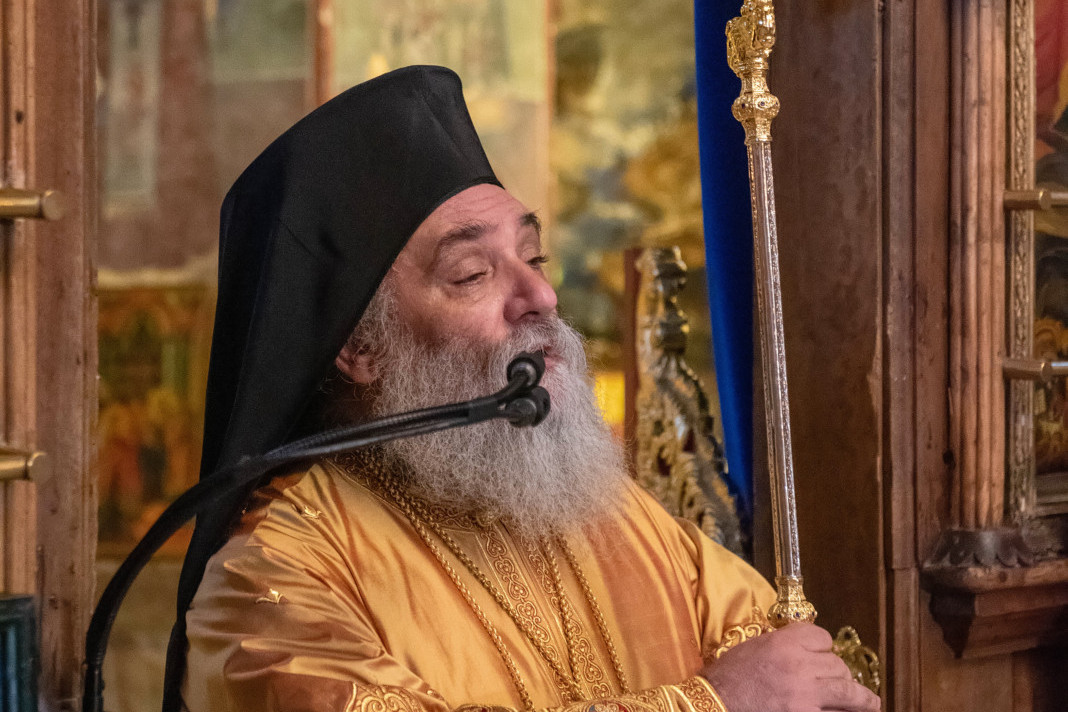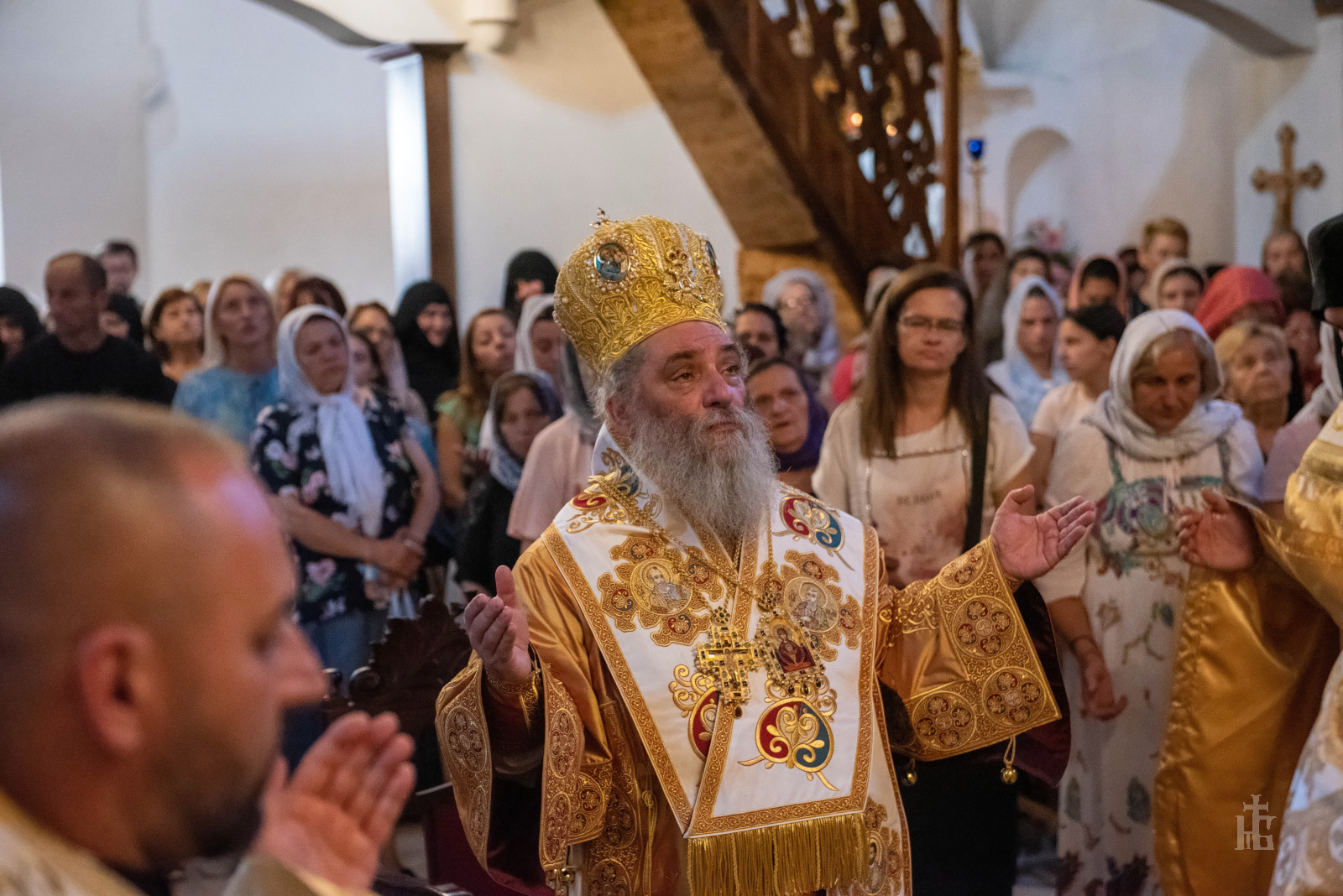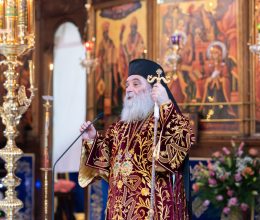Sermon of His Grace, Bishop Partenij of Antania, Abbot of the Holy Monastery of Bigorski, delivered during the Divine Liturgy on the Feast of the Transfiguration of the Lord, at the Monastery of the Most Holy Theotokos in Kichevo, on August 6/19, 2023
In the name of the Father, and of the Son, and of the Holy Spirit!
Let us give thanks to God, beloved brothers and sisters, for once again, in this holy and honorable Monastery of the Most Pure Mother of God, He has deemed us worthy to celebrate the radiant and great Feast of the Transfiguration of the Lord. This feast shows us with great clarity what will happen to those who, at Christ’s second coming, are recognized by Him through their good deeds and who will hear His divine voice saying: “Come, you blessed of My Father; inherit the kingdom prepared for you from the foundation of the world” (Matthew 25:34). On that day, their bodies will also be transfigured in the Creator’s light and will shine brighter than the sun, just as Christ shone with the radiance of His glory before His three disciples—Peter, James, and John—in the presence of the two great Old Testament prophets, Moses and Elijah. Moses, the giver of the Law, and Elijah, its fervent keeper, bore witness that Christ is the promised Messiah, the Savior of the world. It was He who was to transfigure and redeem humanity, created by God’s love—a mission He fulfilled through immense labor and sacrifice. First, He prepared and elevated humanity through His chosen prophets, and then He Himself became man, and by His sacrifice on the Cross, He conquered the tyranny of the devil and death, offering all of us the possibility of salvation.

The extraordinary event on Mount Tabor took place just before Christ’s Passion on Golgotha, for with this vision, He sought to strengthen His three disciples—and through them, all of us—so that they might understand that He is truly the Son of God and that true enlightenment comes only through great labor and suffering. At that time, the apostles struggled to comprehend how their Master, who had performed such extraordinary miracles, could be so humiliated as to die on the Cross. In this context, the interpretation by Saint Theophylact of Ohrid of the words spoken by the Apostle Peter—uttered, as it seems, in a state of spiritual ecstasy—becomes particularly interesting: “Lord, it is good for us to be here; if You wish, let us make three tabernacles: one for You, one for Moses, and one for Elijah” (Matthew 17:4). Blessed Theophylact explains that Peter’s words were motivated by the overwhelming divine experience, coupled with his deep love for Christ, as he could not bear the thought of the Lord’s impending suffering. For Christ had foretold that in Jerusalem He would suffer and die. At that moment, Peter wished for nothing more than for his Master to remain there. And even if His enemies were to come looking for Him on the mountain, the great prophets Moses and Elijah were there as powerful protectors. Peter knew that Moses had once overcome the mighty Egyptians, and that Elijah had called fire down from heaven. Surely, they could easily deal with Christ’s enemies as well.
The Apostle Peter’s reaction on Mount Tabor was very human, for we humans find it difficult to understand and accept that there can be no transfiguration, no spiritual ascent, without the Cross. Even the physical ascent up the high Mount Tabor required effort and labor before the apostles could experience the true transformation. Similarly, spiritual enlightenment is impossible without first rising above everything earthly. Throughout the Scriptures, we find many examples of this. When God wanted to speak with His prophets, He called them to ascend high mountains, symbolically teaching that moral elevation and purification are necessary to commune with Him. The prophet Moses was summoned to climb Mount Sinai, a steep and inaccessible place. Likewise, God called the prophet Elijah to Mount Horeb, which he reached only after traveling for forty days and nights. And in today’s feast, we see that the Lord Himself ascended a high mountain, leaving us an example that we too must spiritually ascend, for without personal struggle and sacrifice—without carrying our own cross—transfiguration and resurrection are impossible.
All of us, beloved, were created for this very purpose: to unite with our Creator and Savior. At the holy mystery of Baptism, when a person is baptized in the name of the Triune God—the Father, the Son, and the Holy Spirit—and anointed with the grace of the Holy Spirit, they receive within themselves the uncreated Taboric light, which is a foretaste of the Kingdom of Heaven. This is precisely what the apostles experienced at the Transfiguration. They tasted the Kingdom of Heaven, which had come in power, and because of that, they longed to remain there forever. So overwhelmed was Peter by the divine joy that he began to speak incoherently, being beside himself with spiritual ecstasy. His soul was already living in the blessedness of the age to come. This is why we heard today from his epistle that he continually reminded Christians of what had happened on Mount Tabor: “We did not follow cleverly devised myths when we made known to you the power and coming of our Lord Jesus Christ, but we were eyewitnesses of His majesty” (2 Peter 1:16). He also adds: “Therefore, I will always remind you of these things” (cf. 2 Peter 1:12). Indeed, the goal of our life is precisely this: to be transfigured and to achieve theosis—union with God.

Beloved, let us not allow anything trivial to cause us to miss the true goal of our life. Many things in this world may present themselves to us as important or even as ultimate goals. However, the only thing that truly matters, the goal above all goals, is our salvation—our eternal union with Christ—and our preparation for entry into the “Land of the Living,” which is Christ Himself. This is why the Church calls us to fasting, self-restraint, and prayer, preparing us for this supreme and singular goal. If we place this goal above everything else in our lives, all other matters will fall into place.
Let us ask the Holy Apostles, our powerful intercessors, who witnessed both the Transfiguration and the Resurrection of Christ and who confirmed the truth with their very lives and blood, to guide us on the path so that we do not get lost among the countless minor goals we set for ourselves. Let us not neglect the one true and ultimate goal of our life—our salvation and union with God.
Amen!















